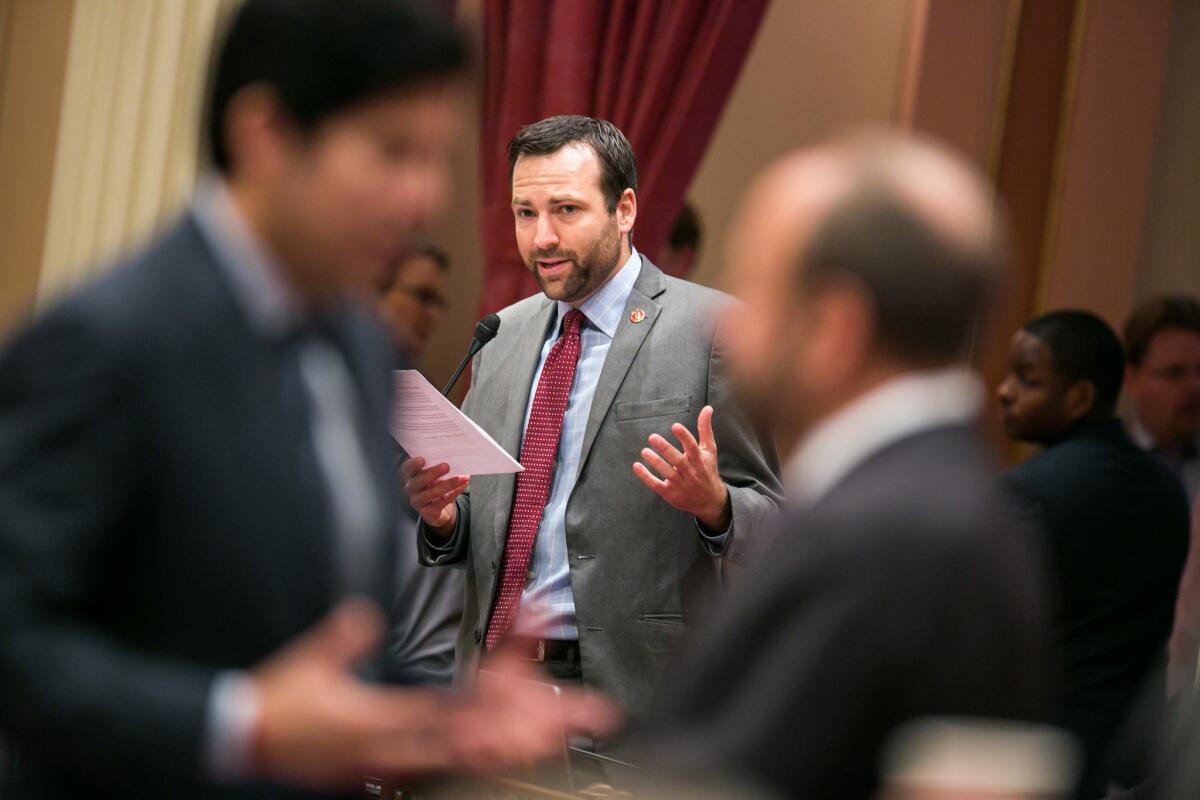California voters could finally weigh in on ‘Citizens United’ in November

Reporting From Sacramento — California voters will likely weigh in this November on the explosion of money in politics, through an advisory measure that the Legislature now has legal permission to place on the statewide ballot.
A quartet of state senators submitted language Thursday to ask voters, through a nonbinding Nov. 8 ballot measure, whether Congress should work to overturn the 2010 ruling by the U.S. Supreme Court in the case of Citizens United.
That controversial ruling, in favor of a conservative nonprofit group, now allows unlimited spending by corporations and unions in federal candidate campaigns — a timely topic, said the proposal’s lead author.
“There is so much concern in the broader electorate about campaign finance reform, about the role of big money in politics,” said state Sen. Ben Allen (D-Santa Monica). “It’s what Donald Trump’s talking about, it’s what Hillary Clinton’s talking about, it’s what Bernie Sanders is talking about.”
The potential salience of the issue aside, the advisory measure was originally envisioned to have a spot on the fall statewide ballot in 2014. But the Howard Jarvis Taxpayers Assn. sued, alleging that the Legislature had no specific power to essentially take the political pulse of the electorate through advisory measures. The California Supreme Court ordered it removed from that year’s ballot while justices fully weighed the legal issues.
In a 6-1 ruling in January, the court ruled in favor of the Legislature by saying there was a “nexus” between a campaign finance advisory measure and possible legislative action in the future. A subsequent court ruling refused to simply reinstate the 2014 measure, with justices ruling that legislators would have to take new action to place the Citizens United proposal on this November’s ballot.
Critics maintain that the Legislature’s majority Democrats are simply trying to boost turnout of like-minded voters for the fall election.
“Everybody knows it’s meaningless, it has no legal impact,” said Jon Coupal, president of the Howard Jarvis Taxpayers Assn. “This is purely a political ploy.”
The bill introduced Thursday uses the same language for the advisory ballot measure as the 2014 version. It describes the need for action from Congress to “allow the full regulation or limitation of campaign contributions and spending, to ensure that all citizens, regardless of wealth, may express their views to one another.”
The advisory ballot measure would go on to say that only “natural persons,” not corporations or unions, have free speech protections under the U.S. Constitution, a key provision of the Citizens United ruling.
Lawmakers have until late June to place the proposition on the fall ballot. If they do so, it would join what’s expected to be a long and contentious list of ballot measures for California voters to sort out.
In 2014, Gov. Jerry Brown allowed the earlier version to move forward but expressed concern about voter confusion, writing in a message to the Legislature that lawmakers “should not make it a habit to clutter our ballots with nonbinding measures as citizens rightfully assume that their votes are meant to have legal effect.”
Allen, a freshman Democrat who chairs the Senate’s elections committee, said that if voters in the nation’s largest state have the chance to speak out on the issue of political money, it may spark a wider movement to change the current rules.
“People want to weigh in,” he said. “If you want to start that conversation, you have to do things like this.”
Follow @johnmyers on Twitter, sign up for our daily Essential Politics newsletter and listen to the weekly California Politics Podcast
ALSO:
November’s big ballot probably won’t be downsized by California’s new election law
That blockbuster California ballot will be a $452-million battle
‘Citizens United’ advisory measure can go on ballot, California high court says
More to Read
Get the L.A. Times Politics newsletter
Deeply reported insights into legislation, politics and policy from Sacramento, Washington and beyond. In your inbox three times per week.
You may occasionally receive promotional content from the Los Angeles Times.











